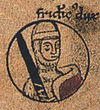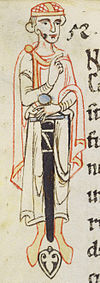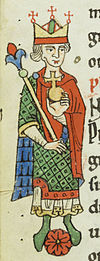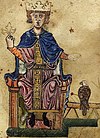Duke of Swabia
The Dukes of Swabia were the rulers of the Duchy of Swabia during the Middle Ages. Swabia was one of the five stem duchies of the medieval German kingdom, and its dukes were thus among the most powerful magnates of Germany. The most notable family to rule Swabia was the Hohenstaufen family, who held it, with a brief interruption, from 1079 until 1268. For much of that period, the Hohenstaufen were also Holy Roman Emperors. With the death of Conradin, the last Duke of Hohenstaufen, the duchy itself disintegrated although King Rudolf I attempted to revive it for his Habsburg family in the late 13th century.
Dukes of Swabia (909–1268)
[edit]
Early dukes
[edit]- Burchard I Hunfriding (d. 911), mentioned as marchio (margrave) in 903 and dux (duke) in 909
- Erchanger Ahalolfing, dominant count in Alemannia after the execution of Burchard I, declared duke in 915, exiled September 916, executed January 917.
- Burchard II (917–926, Hunfriding), recognized Henry the Fowler as king of Germany in 919 and was recognized by Henry as Duke of Swabia in return.
- Hermann I (926–949, Conradine)
- Liudolf (950–954, Ottonian)
- Burchard III (954–973, Hunfriding)
- Otto I (973–982, Ottonian)
Conradines
[edit]- Conrad I (982–997)
- Hermann II (997–1003)
- Hermann III (1003–12)
House of Babenberg
[edit]- Ernest I (1012–15)
- Ernest II (1015–30)
- Hermann IV (1030–38)
Miscellaneous houses
[edit]- Henry I (1038–45, Salian), King of the Romans from 1039 and Holy Roman Emperor from 1046
- Otto II (1045–48, Ezzonen)
- Otto III (1048–57, Schweinfurt)
- Rudolf I (1057–79, Rheinfelden)
- Berthold I (1079–90, Rheinfelden)
- Berthold II (1092–98, Zähringen)
House of Hohenstaufen, 1079–1268
[edit]| Name | Portrait | Birth | Marriage(s) | Death | ||
|---|---|---|---|---|---|---|
| Frederick I 1079–1105 |
 |
1050 son of Frederick of Büren and Hildegard of Egisheim-Dagsburg |
Agnes of Germany 1089 11 children |
21 July 1105 aged 54 or 55 | ||
| Frederick II the One-Eyed 1105–1147 |
 |
1090 son of Frederick I and Agnes of Germany |
Judith of Bavaria 1121 2 children Agnes of Saarbrücken c.1132 2 children |
6 April 1147 aged 56 or 57 | ||
| Frederick III Barbarossa 1147–1152 |
 |
1122 son of Frederick II and Judith of Bavaria |
Adelheid of Vohburg 2 March 1147 Eger no children Beatrice of Burgundy 9 June 1156 Würzburg 12 children |
10 June 1190 aged 67 or 68 | ||
| Frederick IV 1152–1167 |
 |
1145 son of Conrad III of Germany and Gertrude von Sulzbach |
Gertrude of Bavaria 1166 no children |
19 August 1167 Rome aged 21 or 22 | ||
| Frederick V 1167–1170 |
16 July 1164 Pavia son of Frederick III and Beatrice of Burgundy |
unmarried |
28 November 1170 aged 6 | |||
| Frederick VI 1170–1191 |
 |
February 1167 Modigliana son of Frederick III and Beatrice of Burgundy |
unmarried |
20 January 1191 Acre aged 24 | ||
| Conrad II 1191–1196 |
 |
February or March 1173 son of Frederick III and Beatrice of Burgundy |
unmarried |
15 August 1196 Durlach aged 23 | ||
| Philip 1196–1208 |
 |
August 1177 son of Frederick III and Beatrice of Burgundy |
Irene Angelina 25 May 1197 4 children |
21 June 1208 Bamberg aged 30 | ||
| Vacancy: 1208-1212 | ||||||
| Frederick VII 1212–1216 |
 |
26 December 1194 Jesi son of Henry I and Constance of Sicily |
Constance of Aragon 15 August 1209 1 child Isabella II of Jerusalem 9 November 1225 2 children Isabella of England 15 July 1235 4 children |
13 December 1250 Torremaggiore aged 55 | ||
| Henry II 1216–1235 |
 |
1211 Sicily son of Frederick I and Constance of Aragon |
Margaret 29 November 1225 2 children |
12 February 1242 Martirano aged 30 | ||
| Conrad III 1235–1254 |
 |
25 April 1228 Andria son of Frederick I and Isabella II of Jerusalem |
Elisabeth of Bavaria 1 September 1246 1 child |
21 May 1254 Lavello aged 26 | ||
| Conrad IV the Younger 1254–1268 |
 |
25 March 1252 Wolfstein son of Conrad I and Elisabeth of Bavaria |
never married | 29 October 1268 Naples aged 16 (executed) | ||
House of Habsburg (1283–1309)
[edit]Family tree
[edit]Successor states
[edit]In the 13th century, the Duchy of Swabia disintegrated into numerous smaller states. Some of the more important immediate successor states were:
|
|
During the following century, several of these states were acquired by the County of Württemberg or the Duchy of Austria, as marked above. In 1803 Bavarian Swabia was annexed by Bavaria and shortly afterwards became part of the Kingdom of Bavaria.

